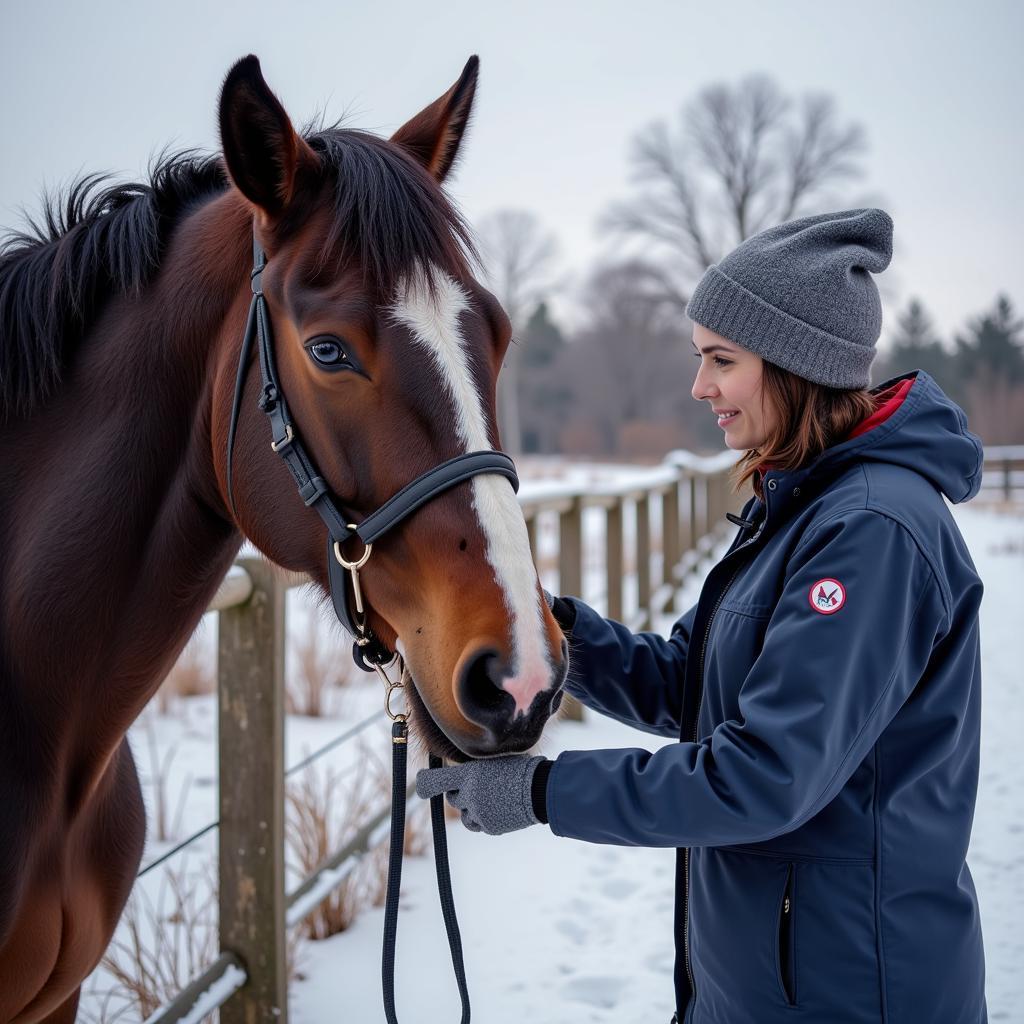Worming Horses In The Winter is a crucial aspect of equine health management that often sparks debate among horse owners. While some believe it’s unnecessary, others advocate for a strategic approach. This guide will explore the nuances of winter worming, helping you make informed decisions for your horse’s well-being.
Why Winter Worming Matters
While parasite activity slows down in colder temperatures, certain parasites can survive and even thrive within your horse during winter. These resilient worms can pose a significant threat to your horse’s health, impacting their digestive system, and overall condition, especially if their immune system is already compromised by the harsh weather. Ignoring winter worming can lead to a larger parasite burden in the spring, making treatment more difficult and potentially causing long-term damage.
Understanding Equine Parasites in Winter
Not all worms react the same way to cold weather. Some, like small strongyles, have a lifecycle that includes an encysted stage within the horse’s gut wall. These encysted worms are less susceptible to deworming medications during winter. Other parasites, like bots, complete their lifecycle during the colder months, making winter a critical time for targeted treatment. Knowing which parasites are active during winter is essential for effective worming.
Identifying the Culprits: Common Winter Worms
- Small Strongyles (Cyathostomins): These worms can become encysted in the horse’s intestinal wall, making them difficult to eliminate during winter.
- Bots (Gasterophilus spp.): Bot larvae mature in the horse’s stomach during winter and are shed in the feces in spring.
- Roundworms (Parascaris equorum): While less of a concern in adult horses, roundworms can still be an issue for foals and young horses, even in winter.
Developing a Winter Worming Strategy
A blanket approach to worming is no longer considered best practice. Targeted worming based on fecal egg counts and your horse’s individual needs is much more effective and helps prevent parasite resistance to deworming medications. Consult with your veterinarian to develop a tailored winter worming program that considers your horse’s age, health status, and potential exposure to parasites. Don’t forget that good pasture management, such as regular manure removal, is crucial in minimizing parasite burdens all year round. You might consider a bot block for horses as part of your overall strategy.
Fecal Egg Counts: Your Guide to Effective Worming
Fecal egg counts (FECs) are a valuable tool for determining the type and number of parasite eggs present in your horse’s feces. This information helps your veterinarian choose the most appropriate deworming medication and schedule. While FECs are useful year-round, they’re particularly helpful in winter, allowing you to avoid unnecessary deworming if parasite burdens are low. If you’re dealing with skin irritations due to insects, swat for horses can offer relief.
Should You Worm Your Horse in Winter? A Case-by-Case Approach
The decision to worm your horse in the winter isn’t a simple yes or no. It depends on several factors, including your horse’s age, overall health, and the specific parasite burden in your area. For example, a younger horse with a higher risk of parasite infestation might benefit from winter worming, while a healthy adult horse with low FECs might not. Discussing your horse’s specific needs with your veterinarian is vital for creating a personalized worming plan. This customized approach ensures your horse receives the necessary protection without contributing to the growing problem of parasite resistance. More information about specific equine health concerns can be found on our page about winter worming horses.
 Veterinarian Examining a Horse in Winter
Veterinarian Examining a Horse in Winter
“A well-structured winter worming program is about more than just administering medication,” says Dr. Emily Carter, DVM. “It’s about understanding the unique challenges of winter parasite management and tailoring a strategy that meets the specific needs of each horse.”
“Remember,” adds Dr. Carter, “regular fecal egg counts are essential for monitoring parasite loads and making informed decisions about deworming.”
Conclusion
Worming horses in the winter is a complex issue that requires a balanced approach. By understanding the lifecycle of winter parasites, utilizing fecal egg counts, and working closely with your veterinarian, you can develop a targeted worming strategy that protects your horse’s health without contributing to drug resistance. If you have a large herd, you might find our article about one hundred and four horses interesting. If your horse suffers from itchy skin, an anti itch shampoo for horses could be beneficial. Ultimately, a proactive and informed approach to winter worming is key to maintaining your horse’s well-being throughout the colder months.
FAQ
- Is worming horses necessary in the winter? It depends on individual circumstances. Consult your vet.
- What types of worms affect horses in winter? Primarily small strongyles and bots.
- How can I determine if my horse needs worming? Through fecal egg counts.
- What is the best worming schedule for winter? It’s best to consult with your veterinarian.
- How can I prevent parasite resistance? By using targeted worming strategies based on FECs.
- What are the signs of worms in horses during winter? Weight loss, poor coat condition, and colic can be indicators.
- How can good pasture management help with winter worming? Regular manure removal reduces parasite exposure.
For assistance, please contact us at Phone: 0772127271, Email: justushorses@gmail.com or visit us at QGM2+WX2, Vị Trung, Vị Thuỷ, Hậu Giang, Việt Nam. We have a 24/7 customer service team.